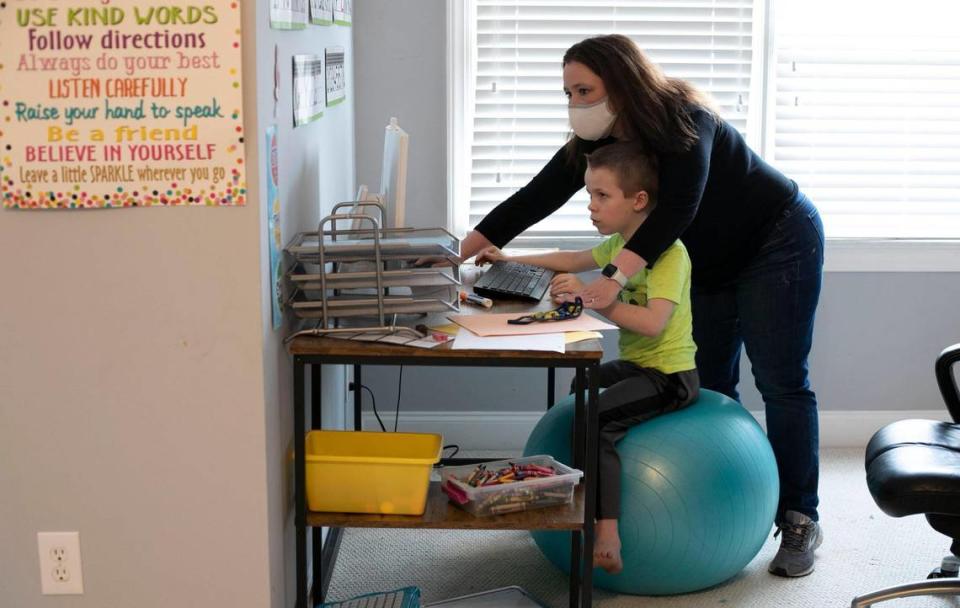NC business leaders urge Pre-K expansion and more money to train how to teach reading
Some of North Carolina’s most prominent business leaders want the state to expand pre-kindergarten enrollment and invest more money in training educators how to teach reading to young students.
The leaders of eight of North Carolina’s largest companies said Wednesday that the challenge of getting children reading by third grade has gotten even harder during the COVID pandemic. But they said their recommendations of enrolling more students in pre-kindergarten and better literacy training for teachers will address the problem.
“North Carolina can be a national model for increasing third grade proficiency if we move forward on the policy recommendations that we have outlined today,” Jim Goodnight, CEO of SAS Institute, said at the virtual press conference. “We’re committed to improving early literacy because it is essential to the children of North Carolina, to North Carolina businesses and to the resiliency of our state’s economy.”
But the CEOs did not answer a question from the media if they’d support raising taxes to help fund their recommendations.
Dealing with the COVID impact
The recommendations come as politicians and educators are trying to figure out how to to deal with the impact of the pandemic. Students have received mostly online instruction for the past 13 months.

At the national level, studies have shown student performance has dropped. The CEOs cited a recent national study from Amplify Education that found that kindergarten and first-grade students have been particularly hard hit.
“COVID learning losses have impacted our youngest children the hardest, and particularly our students of color and those from low-income families,” Goodnight said.
Similar issues are happening in the state. As of February, three quarters of third-grade students who took the beginning-of-grade reading exam weren’t proficient in reading.
“This is simply not acceptable,” said Kelly King, chairman and CEO of Truist Financial. “We owe it to our children to have a bright and promising future. But you cannot have a bright and promising future in the world that we live in today if you can not simply read.”
More money to train teachers
The business leaders said North Carolina is taking a step in the right direction with a newly adopted state law designed to improve early childhood literacy instruction. Elementary schools and Pre-K centers will now be required to train their teachers in using the “science of reading,” a phonics-based approach for teaching literacy skills to students.
But the business leaders said the new law is just the start.
State lawmakers have already approved using $12 million in federal coronavirus relief to begin training teachers in the science of reading. But the CEOs said that $12 million won’t be enough.
“In the weeks and months ahead, the General Assembly and Gov. Cooper will need continued resolve to prioritize significant recurring funding for the long-term success of these literacy priorities,” said Don Flow, CEO of Flow Automotive Companies.
“This level of commitment is how we can successfully embed the science of reading into the very fabric of our entire education system and help all of our students become proficient readers by the time they finish the third grade.”
The new state law steers future training contracts to a specific company, Voyager Sopris Learning, which already got the initial $12 million contract.
Pre-K expansion urged
In 2017 and 2019, the business leaders called for expanding NC Pre-K, the state’s program for at-risk 4-year-olds. They want to reach 75% of the state’s eligible at-risk children.
The state has seen increases in pre-kindergarten enrollment, reaching 31,000 children, roughly 50% of eligible children. But enrollment dropped by more than 9,100 children this school year during the pandemic.
“The drop in enrollment should not be viewed as a decrease in demand or need for North Carolina Pre-K,” said Fred Whitfield, president and vice chairman of Hornets Sports & Entertainment. “To the contrary. Although we have much to overcome, this proven high-quality program, targeted at some of our most at-risk children, is needed now more than ever.”
Whitfield said they want the General Assembly to maintain funding for NC Pre-K and, if possible, increase funding so that expansion can continue.
Other recommendations include encouraging high-quality childcare centers to participate, increasing how much money the state provides per child and helping lower-wealth communities increase participation.
The recommendations come after the State Board of Education submitted a plan in March calling for at least $5.6 billion in new spending over the next eight years to help the state provide every student with a sound basic education.
The “comprehensive remedial plan” is the state’s answer for how it will improve North Carolina’s public schools as part of the long-running Leandro school funding court case. It includes increasing spending for the Smart Start program and the Pre-K program.
But the Republican-led General Assembly has complained that they weren’t consulted in the plan. At a court hearing Tuesday, Superior Court Judge David Lee said he won’t tell lawmakers how much to spend, EdNC reported.

 Yahoo Finance
Yahoo Finance 